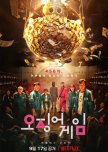The Mad Pastel Infused Survival World Of Hwang Dong Hyuk…
Hwang Dong Hyuk’s’ Squid Game’ is a world where the corruption of capitalism and moral decadence takes allegorical form in the vivid pastel hues of the game arenas.
The “ fight to survival” genre is nothing new in the world of dramas. ‘ Squid Game’ itself comes off as a weird fusion between ‘ Liar Game’ (with the unusual twist of South Korean childhood games) joined together with the blood-stained violence of ‘ Battle Royale’. However the series isn’t without its own unique twists. Even before stepping into the nightmare-fuelled pastel world of Dong Hyuk’s ‘ Squid Game’ prominent messages about South-Korean society from social prejudice, xenophobia, racism, sexism, misogyny and hypocrisy litter their way onscreen.
Actor Lee Jung Jae could vary between overacting with certain line deliverances, as well as oddly heartfelt as main character Ki Hoon . Ki Hoon has hit an all-time-low in life and spends his time between struggling to get out of debt, avoid gangsters and get time to spend with his daughter. When Ki Hoon is given the chance to participate in the game for ₩45.6 billion by Gong Yoo’s brief cameo as the mysterious and suave diplomat for the games , he soon runs in with childhood friend Sang Woo ( Park Hae Soo) and believes the opportunity to compete to be too good to be true. However Ki Hoon is given a new perspective upon life through games and his seeming amorality becomes replaced by feelings of remorse and guilt towards his past actions.
As the series progresses the series reveals that many of Ki Hoon’s competitors (and even the game guards) have their own personal moments of flaws, strengths and ulterior motives for being involved in the game. Ki Hoon’s old childhood friend Sang Woo ( Park Hae Soo) stands miles apart in Ki Hoon’s eyes initially as an alumni of Seoul National University ( one of the top South Korean universities) due to being an intelligent as well as an analytical individual. However Sang Woo has his own reasons for joining the game due to being heavy in debt as well as his risky bets. Alongside Sang Woo and Ki Hoon is kindhearted immigrant Ali ( Anupam Tripathi) who feels indebted to Sang Woo in particular after helping him countless times, however, Ali hides his own reasons for joining the game also. Together their last close ally is an elderly gentleman No.1 ( Oh Young Soo) who despite seemingly joining the game as a death warrant for his illness, No.1 has a lot more to him as a character than initially meets the eye.
Alongside our main team is seemingly merciless North-Korean defector Kang Sae Byeok ( Jung Ho Yeon), violent gangster Jang Deok Soo( Heo Sung Tae), the foul-mouthed and vocal Han Mi Nyeo ( Kim Joo Ryoung) and sardonic outcast ( introduced not until later episodes) Ji Yeong ( Lee Yoo Mi).
Aside from the actual players there is also police detective Hwang Jun Ho ( Wi Ha Joon) who infiltrates the games as a guard in hope of finding the fate or whereabouts of his missing brother. There were many unexpected twists and turns with characters which will certainly keeps viewers on their feet.
However after the halfway point the screenwriting of ‘ Squid Game’ undeniably hit a slight rut. It wasn’t particularly that suddenly the drama felt slow-placed or lacked logic, but there were multiple occasions where plot moments often felt unexplained or lacked more depth. For example there is a brief subplot involving illegal organ donations of deceased players which whilst wrapped up quickly, questioned a lot about how the guards had established this trade for so long behind the frontman( the head honcho)’s back. Additionally there’s also greater questions about the guards and how they became involved, the VIPS ( aside from some questionable acting), how no one has ratted the existence of the games out and ultimately whether the game operators keep tabs on the surviving winner.
However the drama was undeniably quite profound and heartfelt at times . It wasn’t afraid to present the destruction of childhood and the dog-eat-dog world of South-Korean society. Whilst there were some flaws with the series failing to wrap up certain storylines or character arcs, the cinematography of director Hwang Dong Hyuk’s visionary setting is subtle towards more prominent messages, foreshadowing and hints towards the fate and motives of characters.The OST is composed wonderfully by Jung Jae Il who combines original pieces for the series with traditional Korean and orchestra instruments to create an emotional ambience during scenes. In addition to original pieces several classical music pieces were included with one of the most subtle homages being paid through ‘An der schönen, blauen Donau Op. 134 (Johan Strauss II)’ during several scenes. ( For those who don’t know this piece was also used in the controversial game-changer to the survival game genre, the 2000 Japanese movie ‘ Battle Royale’, which helped to inspire the series and is likely a nod and a wink to the film.) The acting front was admittedly a little wobbly at times but fairly good otherwise . Overall ‘ Squid Game’ is a fairly entertaining watch with prominent messages, intriguing characters and twists which will keep you on the edge of your seats. It is not one for the lighthearted.
Considerați utilă această recenzie?
























